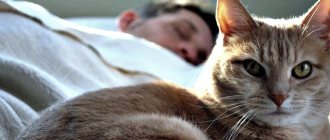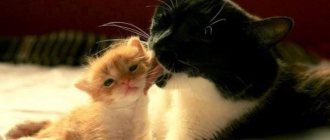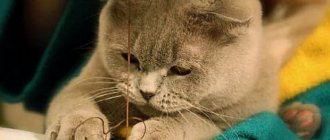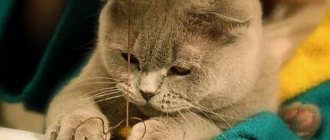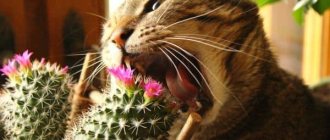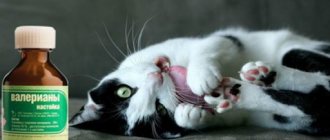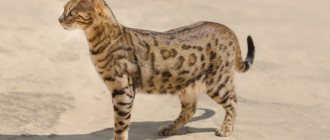All people are very familiar with the plant valerian; they take it in drops or tablets in order to calm down. However, cats behave completely differently after valerian. In our article we will try to figure out why cats love valerian and how it affects their mustachioed pets.
Why Valerian Attracts Cats
Seeing how the behavior of cats changes after consuming this plant, zoologists decided to figure out why cats love valerian, and made several conclusions:
- They like it because of the similarity of the smell of the plant and the smell of hormones present in cat urine. In animals, the level of hormones in the blood increases, up to euphoria.
- The root of the plant contains the substance actinidin, which is addictive in the cat family, that is, it acts like a drug and the cat cannot tear himself away from valerian.
- There is also an opinion that long ago, when cats lived in the wild, they used this plant as a painkiller.
How to please your pet without endangering health
Catnip has a similar effect on cats. This is a herbaceous plant that contains aromatic essential oils, as well as the substance nepetaloctone. It is this component that acts on cats as a powerful pathogen. Even the most sedentary couch potato turns into a perky and jumping ball of energy.
Moreover, the effect occurs without direct use, as with valerian. It is enough for a cat to catch a subtle aroma to feel extreme excitement. Among the reactions: meowing, purring, and even growling. Sometimes hyperactivity appears. The pet begins to run and jump. Rarely, but attacks of aggression do occur.
The mild effect of catnip is due to its short-lasting effect – about 10 minutes. After this period, the animal completely returns to its normal state. And the smell of the plant will begin to bother him no earlier than after 2 hours. Therefore, there cannot be an overdose, as such, in the case of mint.
Scientists studying such reactions suggest that the plant’s effect is based on imitation of the “happiness hormone.” This stimulates the brain receptors, and the cat at this moment feels euphoria and unprecedented energy.
But if your pet decides to eat deliciously smelling mint, you will get the exact opposite effect. He will fall asleep sweetly, or become quiet and calm, since when it enters the body the plant has a sedative effect.
The reaction to catnip is determined by the presence of a specific gene. Thus, cats that do not respond to this plant will produce equally unresponsive offspring.
Pampering your pet with mint is possible, and sometimes even useful. But it is worth considering that essential oils fade over time. When keeping such a pathogen at home, it should be stored in an airtight container.
How does the plant work?
What does valerian mean for cats, can it be given to an animal? There is no clear answer to this question. Let's look at the pros and cons of this influence.
Minuses:
- Valerian for cats is a narcotic drug. At first they experience excitement, then relaxation occurs, right up to a narcotic sleep.
- Valerian is a hallucinogenic drug for cats.
- Valerian and cats are incompatible things, but the animal thinks differently. If you give it to your pet, he will get used to this drug and do everything to try it again and again. If an animal is given a large amount of water to drink, a coma may occur, which manifests itself as follows: the cat falls to the floor, it develops convulsions, foam, and its eyes roll back.
- Sometimes death may occur due to heart attack, stroke or respiratory arrest.
- Sometimes, consuming this plant may cause your pet to experience panic and uncontrollable behavior that will last for several days.
Valerian has no effect on kittens less than six months old.
Pros:
- You can give the plant to relieve pain caused by spasms; it relieves gastrointestinal spasms well.
- For diseases of the thyroid gland, it can be given as an infusion.
- Used for nervous and cardiovascular diseases.
- Sometimes, for eye diseases, rinsing is done with an infusion of valerian root.
Application in veterinary medicine
The effect of valerian on cats is completely different from that on people, but it is also sometimes used in veterinary medicine. In very small doses it can be prescribed for:
- Diseases of the gastrointestinal tract;
- Diseases of the nervous system;
- Diseases of the endocrine system.
Valerian acts on animals as an aphrodisiac. It affects the central nervous system and indirectly affects other organs and systems of the animal’s body. Valerian also contains substances that can affect the production of hormones in cats.
Valerian is also used as a stimulant if young cats behave too passively. Sometimes veterinarians recommend adding a little valerian to animals' food to improve appetite and digestion.
In any case, valerian is a medicine that has a strong effect on cats, which triggers a number of physiological reactions in the animal’s body. It’s not worth giving it to animals for fun, to see what happens to them. A dosage that is considered small and safe for humans may be too large and dangerous for an animal.
Interesting video: a cat’s reaction to valerian tincture
How to make an infusion to treat certain diseases
Valerian and cats can be compatible, if, of course, the herb was prescribed to your pet by a veterinarian. For medicinal properties, it is used when the root of the plant is previously crushed and infused in boiling water (5 grams of the root is infused in a glass of boiling water for 2 hours in a water bath).
You can give the infusion strictly in the dosages prescribed by the veterinarian, otherwise an overdose may occur.
Other cat herbs
In Russia, the most famous cat “drug” is valerian. But the list of plants that can cause euphoria does not end:
- Catnip promotes positive emotions in 75% of cats. It is not addictive, safe, and inexpensive. Stores sell toys, scratching posts soaked in mint, and sprays.
- Tatarian honeysuckle - decorates a garden plot, is ideal as a hedge, but also attracts cats. Animals that are indifferent to mint and valerian will definitely show interest in honeysuckle. Honeysuckle-based preparations in their pure form are not easy to find in stores. But there are toys filled with plant sawdust.
- Actinidia polygamous (matatabi or Japanese catnip) is a plant that no cat will remain indifferent to. Not very common in pet stores, mainly through online orders.
All euphoretic plants are used to help animals get out of stress and improve their mood. But it is unacceptable to use them on a regular basis, since psychoactive drugs cause addiction, withdrawal symptoms and hangover symptoms.
Site Expert
Alexandra Maksimovna Palagina
Education: Moscow State Academy of Veterinary Medicine and Biotechnology named after. K.I. Scriabin, Faculty of Veterinary Medicine, specialty – veterinarian
Ask a Question
Behavior of cats after taking valerian
Everyone knows that a cat and valerian are incompatible concepts; it acts on pets like alcohol or a drug. Zoologists say that valerian and a cat are the same as cocaine and a person. Scientists say that the animal will experience a state of euphoria, hallucinations, and a lack of coordination. Sometimes pets are unable to stay on their feet, sway in different directions, do not fit into the doorway, roll on the floor, they either attack an invisible target or flee from a non-existent enemy. During all these actions, they scream loudly and do not get their bowl - naturally, valerian is harmful to their health.
If you periodically allow the use of valerian, which is harmful to the cat, then you can subsequently end up with a degraded animal, with completely forgotten skills, with ignorance of its bowl, tray and even owner. His hair will begin to fall out, baldness will begin, and signs of depression will appear.
If the pet, after strong excitement and euphoria, sleeps soundly, then it is necessary to urgently take it to the clinic.
Is valerian dangerous for cats?
It is not known how beneficial or harmful valerian is for cats. Its effects on humans have been well studied in various scientific and clinical studies, while its effects on animals have been virtually unstudied. What is certain is that valerian is contraindicated for pregnant cats, as well as animals with liver and kidney diseases, and too large doses of the medicine, even in completely healthy pets, can cause death.
Some veterinarians claim that valerian is perceived by cats as a drug. It can cause hallucinations in them, which cause the animal to rush around the apartment, fighting a threat invisible to others.
Valerian is also believed to be highly addictive in cats. Often, having tried valerian, cats go crazy and start looking for a new opportunity to get it. Animals run around the house in search of the treasured bottle or bag of dried roots. They become aggressive, rush at the owner, and meow loudly. Wanting to calm the pet down, the owners give him a new dose of medicine. However, this calms the cat for a short time, and then he begins to behave inappropriately again. Such dependence will clearly not benefit the animal, and its behavior will bring a lot of trouble to the owners. If such a problem arises, it is better to contact a veterinarian, who will tell you how to help the cat and wean him off valerian.
It is also useful to read: Will valerian help during pregnancy and is it worth taking it at all?
The most dangerous for cats is valerian tincture. Cats tolerate alcohol very poorly, and the tincture contains about 70%. Giving valerian to cats in this form is not recommended. In addition, the animals themselves often refuse it. Although cats smell the valerian from a distance, which attracts them, they may not come up to sniff and taste the poured tincture for a long time until the alcohol completely disappears from there.
There are known cases of cats dying from alcohol when they were given a simple pharmacy tincture of valerian.
On a note
The cat’s body, due to physiological characteristics, is not able to process alcohol. When cats consume even a small portion of alcohol, liver and kidney damage occurs, and general intoxication of the body develops, which can be fatal.
Dried roots or fresh valerian herb are less dangerous. Sometimes cats find it on the street and eat it. Moreover, under natural conditions, animals do not eat such quantities of plants that could cause them harm. At home, cats can behave differently: having found roots, decoction or tablets, they can literally not leave them a single step, using a large dose of medicine.
An overdose of valerian can occur in a cat very quickly. An accidentally spilled bottle of tincture or 2 or more tablets of valerian extract found by a cat can be life-threatening. In addition to valerian, the tablets contain various synthetic substances that can cause an allergic reaction and poisoning in cats. If your cat has eaten a lot of valerian, you should show him to the veterinarian. A large dose of the drug can first cause coma in a cat and then death.
Does valerian affect all cats the same?
It’s interesting, but there are some mustachioed pets that can’t stand the smell of valerian. Approximately 30% of cats are not susceptible to this medicinal plant. There are breeds of cats that do not react to it in any way, for example, the percentage of intolerance to valerian in Siamese cats increases significantly - approximately 70% are not friendly with this insidious plant. Scientists, trying to answer the question of why cats love valerian, came to the conclusion that the hereditary factor plays an important role, that is, when the parents were dependent on it, the offspring will also be not indifferent to its influence.
Cats are less prone to valerian-induced addiction than female cats, in which the susceptibility increases by 3 times.
We hope that after reading our article, every owner will conclude that a cat and valerian are opposite concepts. Of course, it is not a fact that your pet will be affected by this drug, but health, both physical and psychological, is still more important than experimenting with the effect of valerian on your cat.
Overdose
Unfortunately, frequent and uncontrolled use of valerian by cats can lead to serious consequences. If the following signs appear, you should immediately contact your veterinarian:
- loss of coordination;
- dysfunction of the limbs;
- tipping on its side;
- eye rolling;
- body cramps;
- foam at the mouth.
Do not try to save the cat yourself. The listed symptoms indicate an overdose of valerian, the consequences of which can only be eliminated in a specialized clinic.
If after reading the article you still have a desire to give your cat valerian, it is better to buy special toys for him, treated with the essential oil of a medicinal plant. The animal will definitely be grateful to you, and no damage to the pet’s health will be caused.
